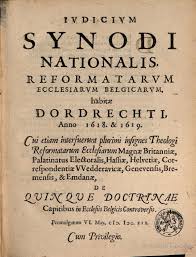The Canons of Dort (1619) and Ethnoracial Distinctions

23 September 2024
The second head of doctrine of the Canons of Dort (1619) pertains to the doctrine of limited or effectual atonement, the teaching that Christ’s atoning sacrifice was truly and fully effectual in terms of delivering sinners from the righteous wrath of God, and therefore applies for the elect only. In the eighth article of the second head, the confession teaches:
For this was the sovereign counsel, and most gracious will and purpose of God the Father, that the quickening and saving efficacy of the most precious death of his Son should extend to all the elect, for bestowing upon them alone the gift of justifying faith, thereby to bring them infallibly to salvation: that is, it was the will of God, that Christ by the blood of the cross, whereby he confirmed the new covenant, should effectually redeem out of every people, tribe, nation, and language, all those, and those only, who were from eternity chosen to salvation, and given to him by the Father; that he should confer upon them faith, which together with all the other saving gifts of the Holy Spirit, he purchased for them by his death; should purge them from all sin, both original and actual, whether committed before or after believing; and having faithfully preserved them even to the end, should at last bring them free from every spot and blemish to the enjoyment of glory in his own presence forever.
In the original Latin the words commonly translated as “people, tribe, nation, and language” are populus, tribus, gens, and lingua. Populus is rightly translated as people, tribus is rightly translated as tribe and lingua is rightly translated as language. While the word gens, which strictly speaking refers to a group of people sharing the same ancestry, can sometimes be translated as nation, here it is clearly listed as a distinct category from populus or nation, meaning that in this context it clearly refers to a biological category in the classification of living organisms that is larger than the tribe or nation but smaller than the species, as the word had been commonly used since at least the second century AD—see Juvenal’s Satires VIII. Moreover, the term gens certainly cannot be understood as merely referring to people with a shared culture, language, or state (i.e. a proposition nation), as it strictly refers to a people group in terms of their shared ancestry, i.e. a distinct ethno-racial people. In the 1890 Dictionary of Greek and Roman Antiquities it is said that the word can be “applied either to the whole or to part of a political community, in either case with special reference to common descent.” Moreover, as the dictionary also points out, the Latin word genus, which means race, can be “taken as an equivalent, as it not unfrequently is, to gens.” The two words also share a common root in genh, which means to reproduce, and which is of course also from whence the English word genetics originates. That gens is also specifically used in Canons of Dort 8.2 as an equivalent of genus is clear from the fact that the earliest Dutch translation of the text renders the word as “geslachten”—a word which all dictionaries show was historically understood to be the Dutch equivalent of genus.1
What is particularly significant here is the fact that the confession expressly recognizes as not only nations, tribes and language groups, but also ethno-racial groups as an important creational or natural reality ordained by God as well as a covenantal category to which the elect belong. In other words, for the Synod of Dort, these categories served as the covenantal identity markers for the elect. As the Dutch Calvinist theologian Herman Bavinck (1854—1921) also later noted:
God does not manifest his covenant of grace by ripping people away from their humanity and establishing a covenantal community outside of our natural state, but He brings that covenant into humanity itself, makes it part of the world, and ensures that it remains protected from evil in this world. As Redeemer, God follows the same path he does as Creator and Ruler of all things. Grace is something different to nature, but it joins with nature so as not to destroy it but rather to renew it. Grace is not an inheritance that is not acquired by virtue of natural descent, but it is covenantally maintained through the natural relations embedded in human nature. The covenant of grace does not randomly jump to and from one individual to the next, but is maintained through families, races, and nations in an organic fashion.2
Adhering to the doctrine of limited atonement, at least as the Synod of Dort understood it, therefore entails adhering to race realism.
1. Later translators have also increasingly recognized this. Whereas translators of the Canons of Dort historically rendered the words gens or geslachten as “people,” Richard B. Gaffin, in his recent translation of Geerhardus Vos’ Reformed Dogmatics, corrected this by translating Vos’ use of the same word as “race” (Geerhardus Vos. 2020. Reformed Dogmatics. Lexham Press, p. 118).
2. Bavinck, H. 1914. Handleiding bij het onderwijs in den Christelijke godsdienst. Kampen: Kok. In my book Assailing the Gates of Hell (2020. Reformation Zion Press, p. 120) I erroneously translated the Dutch word geslachten as “generations” instead of “races.”